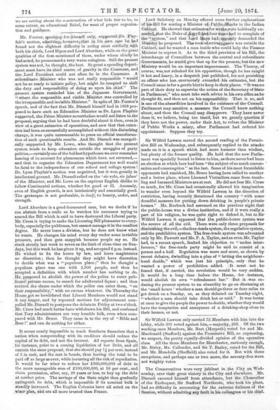Lord Salisbury on Monday offered some further explanations of his
Bill for seating a Minister of Pnblie&W.orks in the Indian Cabinet. He showed that estimates for works were habitually ex- ceeded,that the Duke of,Argylliradfour times had to complain of the "system," and that Lord Mayo had, urgently demanded the- Ministry be proposed. The root oLextravagance was outside the- Cabinet, and he wanted a man inside who could help the Finance- Minister to repress it. As to the third provision of his Bill, the interchange of Councillors between the central and subordinate Governments, he wouldgive that up for the present, but the new- -Ministry would. be-an-impertantimprevement The Viceroy, of course, was not rebuked for his opposition, though he has caught -it hot and heavy, in. a despatch just .published, for not punishing- an officer who baa, enormously exceeded his estimates, but the Council came in for a gentle hintto keep in their places. "It was no- part of their duty. to supervise the action of the Secretary of State- in Parliament," who must take such advice in his own office aa he fit, and-then act on his reapopsibility. 'That is so, and is one of--theabsurdities involved in the existence of the Council. Parliament may sanction a measure the Council know nothing- about, and. then the Council may disapprove. They have never- done it, we believe, being too timid, but we greatly, question if they have not the power, under their Act, to refuse the Minister of Public Works a salary, after Parliament had ordered his' appointment. Suppose they try.


































 Previous page
Previous page